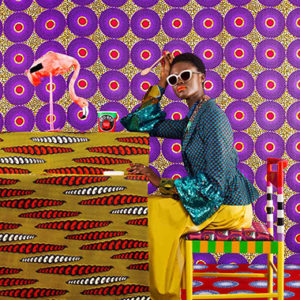Whether it is Toni Morrison’s Song of Solomon or the impact of black preachers, black culture is based on “cut and repetition”. Snead notes that black culture is based in the process of “cutting” or stopping, going back, and continuing with the process; the process could describe music, spoken word, or figures within black culture. Black culture is “circular” whereas European culture “accumulates” (67). Yet both are flawed, black culture is doomed to “always suffer in a society” where it is based in material progress. European culture will continue to realize its limitations because “repetition has been suppressed in favor of fulfillment” (71). Therefore in the context of race relations, having solely either will result in each struggling against each other.
How the World was Made- a Super Crown
While searching for an afrofuturistic piece of work, I found this poem written by Rodger Bonair-Agard. The poem titled How the World was Made- a Super Crown incorporates aspects of West African and Caribbean folklore and does something new with it.
Modern Music and Afrofuturism
One of my long-time favorite bands is Gorillaz. They’ve been making music since the 1990s, and the word I’ve most often used to describe them is “experimental”. They feature many different artists on their albums; the one that actually made me want to discuss them for this prompt was Grace Jones, who was featured on one of their more recent albums, Humanz. I’ve enjoyed the bands music for years, and although the reviews for Humanz were mixed, I’m listening to it as I type. The band has definitely experimented with hip hop before, but Humanz featured hip hop artists I enjoy independently: Vince Staples, Vic Mensa, and Pusha T, to name a few. The way the band uses not only hip hop, but pop, electronica, and alternative rock can create sounds unlike any other. The minds behind the band are two white men from England named Damon Albarn and Jamie Hewlett (although Albarn is the primary artist). Yet here lies another unique aspect of the band; they do not use their own faces. The official band has four members, all nonexistent fictional characters with their own stories. The actual human minds behind the music are almost completely nonexistent, and the characters serve as the real face of the group.
Afrofuturism in furniture



When I started looking for Afrofuturism case studies, I mostly understood the kinds of art that fell into the category, but really struggled to see more day-to-day manifestations of the same Afrofuturist impulse. Although I’ll probably end up doing my final project on Octavia Butler or another Afrofuturist literary figure, I found, for this assignment, a really interesting example of Afrofuturist design, specifically as it relates to furniture, which really departs from the text-based analyses we’ve primarily focused on so far.
Working out of London, the designer Yinka Ilori repurposes furniture in an up-cycling operation. Within this project, Ilori upgrades old furniture to make a statement on the value of “old” items and, furthermore, undermine the consumer society’s incentives to purchase constantly new products that don’t fill a need any greater than that product which one already has. To honor his heritage, Ilori decorates the upcycled furniture with vibrant colors and geometric designs, in the same vein as the dominant designs in Nigeria (the place to which he pays homage).
Based on what we’ve learned, Ilori’s work seems to epitomize the value that Snead puts on repetition within black culture: “Black culture highlights the observance of such repetition, often in homage to the original generative instance or act,” (65). Indeed, with his furniture, Ilori both honors Nigeria and rejects the principles of vapid consumerism that Snead explicitly associates with white culture.
Afrofuturism in Food
When asked to find a text to look at for Afrofuturism, I thought I’d look at a topic that everyone is involved with everyday, food. Food is an important part of everyone’s life and it can be a source of connection and community for people. So I found a cookbook that is focused on taking a new look at food from regions of the African Diaspora and making vegan recipes out of traditional Africa, Caribbean, and Southern US foods. Continue reading “Afrofuturism in Food”
Renee Cox (Afrofuturism)
I have struggled in finding things that are Afrofuturistic, because I think like many people I find it difficult to pin down an exact definition of this topic (shout out to one of my classmates posts from last week) yet as Professor Lytton Smith has suggested (please excuse any inaccuracy in my paraphrasing) Afrofuturism is an ever-evolving area of study, thought, art, etc thus its definition is surely frequently being altered and added to.
Lack of Nature in Western Culture
The passage from Snead that focused on repetition was really informative for me. He claims that the lack of repetition in Western culture is truly at odds with, not only the cultures of Asia and Africa, but nature itself. Honestly, after thinking on what he claims I end up completely agreeing. Western culture marks the seasonal changes with holidays that are more and more connected to consumerism rather than the actual nature based origin of the holiday. Christmas came to mind when reading this passage as these days, from this reader’s perspective, the holiday may still be considered a religious holiday but the underlying focus is on buying and giving gifts. The origin of the holiday itself, it is argued, not Christian at all, Continue reading “Lack of Nature in Western Culture”
Langston Hughes and Afrofuturism
Afrofuturism is hard to explicitly define. Wikipedia defines it as using “…science fiction, historical fiction, fantasy, Afrocentrism and magic realism with non-Western cosmologies in order to critique the present-day dilemmas of black people and to interrogate and re-examine historical events”. By this definition, Langston Hughes practices parts of this himself in one of the poems we read this weekend. He writes “[d]reams and nightmares…dreaming that the negroes of the South have taken over- voted all the Dixiecrats right out of power- comes the colored hour: Martin Luther King is Governor of Georgia, Dr. Rufus Clement his chief advisor, Zelma Watson George the High Grand Worthy. In white pillard mansions sitting on their wide verandas, wealthy negroes have white servants, white sharecroppers work the black plantations, and colored children have white mammies…”(Ask Your Mama, pages 91-92). In a way, this does what a part of afrofuturism aims to do, but without a sci-fi or fantasy theme. Continue reading “Langston Hughes and Afrofuturism”
Blog Post Week 3
What has really interested me in this class is analyzing afrofuturism in different mediums; not just literature. I like that we watch clips of Black Panther and talk about the artistic choices made to portray afrofuturism and the effect it has.
Another thing that has interested me is reading texts that are quite challenging. It is had to come across classes that assign texts written by authors/poets of color. Continue reading “Blog Post Week 3”
Music and Afrofuturism
A part of this class that has really interested me is music’s role in Afrofuturism. Before this class, all of my knowledge about Afrofuturism centered around Black Panther. The assertion that Dirty Computer by Janelle Monae could be an Afrofuturist text was extremely intriguing to me. I started to explore this further and found tons of videos and interviews that Monae has been a part of where she talks about her role as an Afrofuturist artist. My favorite anecdote from one of these interviews is when Monae tells the interviewer from Rolling Stone, “But I only date androids. Nothing like an android — they don’t cheat on you.” As I moved past Monae and moved on to researching Afrofuturist music as a whole, I was surprised to see an article from the BBC entitled “8 afrofuturist classics everyone needs to hear.” I couldn’t believe that I had never heard of the movement before registering for this class, but there were “classics.” I was admittedly embarrassed. In any event, music’s role in the movement pairs ideology with the personas these musicians take on stage, the lyrics that they write, and the clothes that they wear. It is interesting to see how the movement manifests itself.

